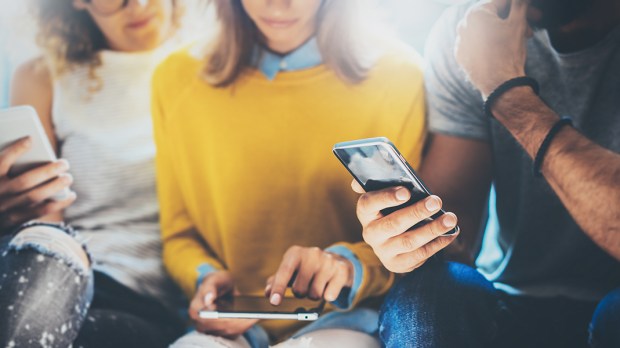The advent of smartphones, tablets, and social media has allowed us to stay connected every minute of the day, and even at night while we’re trying to sleep! As our brains have to cope with a constant barrage of information, we’re left feeling more and more tired and stressed. So, what if we learned how to unplug and get in touch with reality … even if it’s just on the weekends?

Read more:
How to have a healthier relationship with your smartphone
Julie, a 33-year-old graphic designer and the founder of a communications agency, used to be connected 24/7 on the net: working continuously, checking her emails without fail, jumping back and forth between the numerous windows open on her screen, and replying to her clients on Saturdays at 2 a.m., thanks to her iPhone. She was always one click away from dealing with another work issue. She felt like superwoman, able to manage everything, at all times.
And Julie is not alone. The American Psychological Association reported that nearly half of employed adults stay connected outside of office hours (that is, on the commute, evenings, weekends, and vacations). And at the same time, workers have also reported dealing with personal issues while at work. The use of new communication tools has changed the way we work and has accelerated a phenomenon known as “blurring,” where the boundaries between home and work life become hazy.

Read more:
Should younger kids have smartphones? Bill Gates doesn’t think so
Some people consider this ability to stay connected as pretty convenient, leading us also to be able to work from the comfort of our own homes. And while we might perceive working remotely as a way of increasing productivity, for some it’s also a source of stress. They find themselves permanently in demand, often feeling like they’re working too much and can’t seem to switch off. These hyper-connected workers would love to be able to manage their digital feed better, but somehow, they just can’t. It’s logical in a way; the web has become a continuation of our conscience. And with Pew Research finding that nearly 77 percent of Americans now own a smartphone, our daily lives are being invaded by the digital world, following us wherever we go, even on vacation!
So why are we hooked?
We can’t blame this hyper-connectivity simply on our colleagues and our boss; we need to look closer to home and our own habits. “We’re embracing it when we check our messages every two minutes, and surf the web the minute we get an opportunity,” points out sociologist, Catherine Lejealle. While (trying) to work, we tweet an update, post a photo on Instagram, pin something on Pinterest, comment on Facebook — and, of course, we then need to check if we’ve been “liked.” This social networking takes up about two hours a day for the average American!
Those all-too-familiar notification pings get us hooked, leaving us constantly checking the latest news and messages. “I didn’t realize that I was working constantly; surfing the internet can be so educational!” explains 38-year-old community manager Sophie. Roaming the web is not only easy and fluid: it’s also captivating. This hyper-connectivity makes us believe that we’re indispensable, a super-professional employee. It gives us a feeling of “power, the feeling of being recognized and valued, the impression of being active and knowing everything in real time,” adds Catherine Lejealle. “It also seems to provide a solution to our fears (of missing out on the latest information, a social interaction, an event), that anxiety otherwise known as FOMO or Fear of Missing Out.” The psychiatrist Christophe André evokes this digital bingeing in Psychologies magazine: “We’re becoming obese on useless information, on virtual links. We’re no longer able to auto-regulate ourselves.” And what’s worse, this digital storm leaves us mostly unsatisfied.
Harmful side-effects
One year ago, Julie experienced a mini burnout: “I was at the end of my tether. I just couldn’t stand anyone, not even my clients. My work was polluted by multiple interferences from the net. I felt overwhelmed with messages, applications, and information. I was caught up in a cycle. But most importantly, I was suffering from insomnia. I read that this was due to visual pollution.”
The hyper-connected often feel their heads are fit to explode, that they are lost, always on the go, and intellectually impoverished. It’s not us using the internet, it’s more a case of the internet using us; it sends our concentration into a tailspin, distracting us from our work, and causing us sometimes to make blunders – like the times we send a work email in between two subway stops, only to realize we’ve sent it to the wrong person.

Read more:
How to unplug for 40 days and 40 nights
The laboratory of interactive media at Stanford, which originally wanted to prove the benefits of “multi-tasking,” concluded that “individuals who do many things at the same time mix up information. They believe everything and anything without any discernment. These multitaskers are quite simply bad at virtually all the tasks.” What is true, however, is that those addicted to the web suffer from cerebral modifications similar to those dependent on drugs or alcohol, according to a Chinese study: “Subjects who have internet dependency issues show structural and functional changes in the parts of the brain involved in how we treat emotions, decision-making, cognitive control, and executive attention.”
Switch everything off ?
It’s practically impossible to remove the internet completely from our lives. It has allowed us to make impressive progress: it is a tool offering freedom, knowledge, communication, and material for reflection. One condition of taking back our power is to master the tool, using it in a reasonable manner and accessing it purely out of necessity: basically speaking, getting unaccustomed to it.
Julie threw her Mac out of the house, together with the notifications and pop ups on her iPhone. During the evenings and weekends, she switched off the wifi. For the first few weeks, an irresistible desire pushed her to sneak a peek on her screen. “It was hard, especially for my professional conscience. I was stressed at the idea of not responding to my clients straight away. I set up an automatic email response saying that I’d received their message. This informed them that they would have to wait until Monday, or until I returned from vacation, to deal with any issue.”
To help Julie’s mission to unplug, she went back to modern jazz dance classes twice a week in the evening. She came out so exhausted that she wasn’t even tempted to take a quick look at her emails. On Mondays, she manages a batch of emails, and in one morning she manages to deal with them all. To concentrate better, she places her smartphone the wrong way round, puts it on silent, and at 5 p.m. she takes a break and allows herself to navigate or have a little chat.

Read more:
Note to college kids: Your social media behavior can cost you a scholarship
As for Sophie, she empties her head by watching wildlife documentaries and also taking a few stretching classes. “I remember feeling really panicky in the first session. Ninety minutes without touching my phone or sharing my thoughts seemed pretty insurmountable. The more I got into my exercises the more I felt I was emptying my brain. Nothing happened — I didn’t write anything, and I didn’t share anything. Since then I’ve been going to these classes every Sunday evening. Alone. I start off my week feeling calm, focused, with all my thoughts in place. Doing these classes is a way of wiping the board clean from all the little ‘scribbles’ that I have in my head — all that information that gets mixed up in my brain after an internet session.”
Today, Sophie no longer panics at the idea of missing a piece of information, replying late to an email, or not sending a tweet at the right moment. “That allowed me to realize, finally, that there was a natural selection process with my messages; the most important would always come back to me.” She determines her priorities and focuses on quality interactions. Her latest find is the software OmmWriter, which allows you to work with nature inspired backgrounds, and frees you from all the distractions so you can concentrate properly, while playing soft music at the same time.
She has handed back her work cellphone; her clients can reach her on her work landline. Is she going back in time? Maybe, but the result is that she is now re-living, just like Julie! By becoming a mono-tasker, she has gained in concentration, therefore her creativity and efficiency have increased. The digital world has become her work tool, not her life.
This article was originally published in the French edition of Aleteia, and has been translated and/or adapted for English readers.

